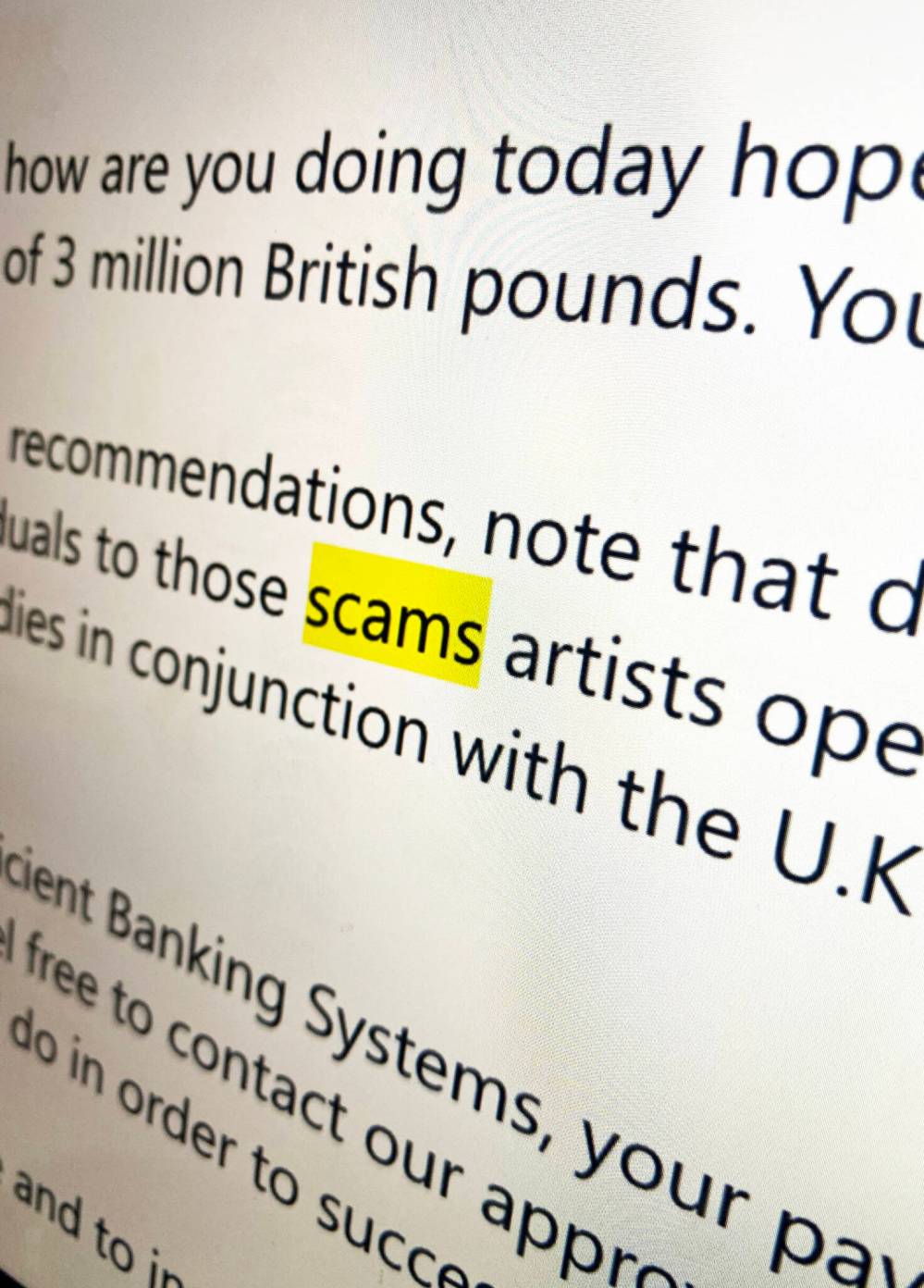Scams, layered upon scams, layered upon scams
Advertisement
Read this article for free:
or
Already have an account? Log in here »
To continue reading, please subscribe:
Monthly Digital Subscription
$0 for the first 4 weeks*
- Enjoy unlimited reading on winnipegfreepress.com
- Read the E-Edition, our digital replica newspaper
- Access News Break, our award-winning app
- Play interactive puzzles
*No charge for 4 weeks then price increases to the regular rate of $19.95 plus GST every four weeks. Offer available to new and qualified returning subscribers only. Cancel any time.
Monthly Digital Subscription
$4.99/week*
- Enjoy unlimited reading on winnipegfreepress.com
- Read the E-Edition, our digital replica newspaper
- Access News Break, our award-winning app
- Play interactive puzzles
*Billed as $19.95 plus GST every four weeks. Cancel any time.
To continue reading, please subscribe:
Add Free Press access to your Brandon Sun subscription for only an additional
$1 for the first 4 weeks*
*Your next subscription payment will increase by $1.00 and you will be charged $16.99 plus GST for four weeks. After four weeks, your payment will increase to $23.99 plus GST every four weeks.
Read unlimited articles for free today:
or
Already have an account? Log in here »
Hey there, time traveller!
This article was published 11/03/2024 (673 days ago), so information in it may no longer be current.
You could call it adding insult to injury.
An uncounted number of people, a percentage of whom have probably been injured by earlier internet scams, received an email this week from Elizabeth Borrison, who, oddly, cannot spell her own name later in her email. (Contact details have been removed to protect the credulous, but the rest of the email is presented verbatim.)
“Hello Dear Good Day to you and how are you doing today hope fine? For your notice the new government of UK London has decided to compensate every scam victim each with a large sum of 3 million British pounds. Your name was listed among scams victims and duly approved for this payment.”

Details from a scam email.
We tell you this after a Free Press story last week outlining how over 1,000 Manitobans lost more than $9 million last year to a variety of scams — internet scams, phone scams, you name it. Across Canada, 41,111 people lost $553.9 million. It is its own particular tragedy — and most often, people find their money is gone forever.
But, never fear, Elizabeth — or Elizbeth — has good news for such victims, if our interpretation of her word salad is accurate: “Based on these faithful recommendations, note that during the last U.N meetings held IN AFRICA and UK London, it was alarmed by the world on the loss of funds by various individuals to those scams artists operating in syndicates all over the world today, most especially African. In order to compensate scams victims, the Africans Bodies in conjunction with the U.K Government now pay a total 3 million British pounds each in accordance with the UK recommendations.”
Lucky, Ms. Borrison will ensure that your money gets to you in some unexplained way by having the United Nations bypass official channels like banks: “Due to corrupt and inefficient Banking Systems, your payments are supervised by the United Nations Officials. For claiming your compensation of 3 millions British pounds, kindly feel free to contact our approved private payment officer Name: Madam Mrs. Jenn Germany … She will instruct what you will do in order to successfully receive your compensation amount immediately. Waiting for your response and to instruct how your funds will be transferred to you.”
Why do scams — even ones that are as tragically transparent as the fictitious Ms. Borrison’s — proliferate?
Well, because they work. Even though they are ham-handed, sloppy, and sometimes laughable, they occasionally work. And that makes it worthwhile for fraudsters to cast their nets far and wide, in hopes of landing even just a few fish.
Others are far more convincing: telephone calls that seem to be from your cell service provider, offering you deals in exchange for “confirming” some personal details, internet romances that lull you into trust before reaching for your wallet, even voice-enhanced calls from your “grandkids” who have gotten in unexpected trouble and need you to send e-transfers to their “lawyer.” If you don’t know how to send an e-transfer, they can get their “lawyer” to talk you through the process.
It is, sadly, part of the interconnected world.
Some basic facts always apply: offers that seem to good to be true, are too good to be true.
Someone who calls you and wants you to supply personal information to verify your information or your account details is fishing — and you’re the catch.
You haven’t won the internet lottery you didn’t enter and the Bill Gates Foundation doesn’t have to spill a few million from the till to make its books balance. If anything, you’re about to lose.
And, if it isn’t already obvious, the imaginary Ms. Borrison isn’t going to bail you out of your last mistake, either.










